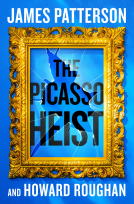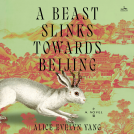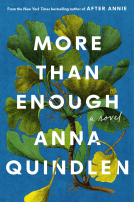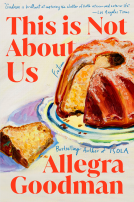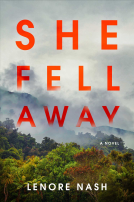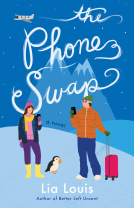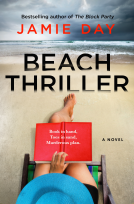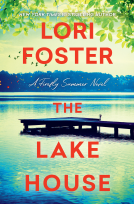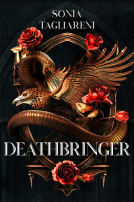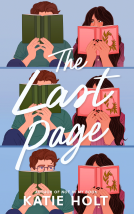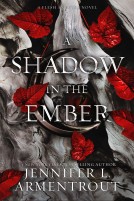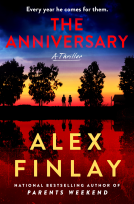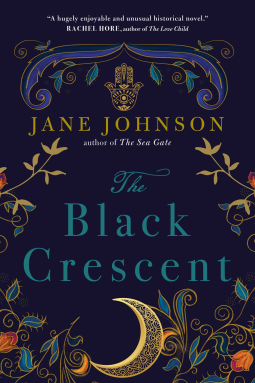
The Black Crescent
by Jane Johnson
This title was previously available on NetGalley and is now archived.
Send NetGalley books directly to your Kindle or Kindle app
1
To read on a Kindle or Kindle app, please add kindle@netgalley.com as an approved email address to receive files in your Amazon account. Click here for step-by-step instructions.
2
Also find your Kindle email address within your Amazon account, and enter it here.
Pub Date Mar 05 2024 | Archive Date Mar 05 2024
Simon & Schuster Canada | Simon & Schuster
Description
A captivating historical novel set in post-war Casablanca about a young man marked by djinns who must decide where his loyalties lie as the fight for Moroccan independence erupts.
Hamou Badi is born in a village in the Anti-Atlas Mountains with the markings of the zouhry on his hands. In Morocco, the zouhry is a figure of legend, a child of both humans and djinns, capable of finding treasure, lost objects, and even water in the worst of droughts. But when young Hamou finds the body of a murdered woman, his life is forever changed.
Haunted by this unsolved murder and driven by the desire to do good in the world, Hamou leaves his village for Casablanca to become an officer of the law under the French Protectorate.
But Casablanca is not the shining beacon of modernity he was expecting. The forcible exile of Morocco’s sultan by the French sparks a nationalist uprising led by violent dissident groups, none so fearsome as the Black Crescent. Torn between his heritage and his employers, Hamou will be caught in the crossfire.
The lines between right and wrong, past and future, the old world and the new, are not as clear as the magical lines on his palms. And as the danger grows, Hamou is forced to choose between all he knows and all he loves.
ABOUT THE AUTHOR: Jane Johnson is George R.R. Martin’s and Dean Koontz’s long-time editor (among other marquis brand authors). She’s also the executor of J.R.R. Tolkien’s estate and is a publisher with HarperCollins UK. She is a novelist, historian, editor and publisher, and has written for both adults and children, including the bestselling novels The Tenth Gift and The Salt Road. Jane is married to a Berber chef she met while climbing in Morocco. She divides her time between London, Cornwall, and the Anti-Atlas Mountains. Connect with her on Twitter @JaneJohnsonBakr, on Facebook @Jane-Johnson-writer, on Instagram @JaneJohnsonBakrim, or visit her website at JaneJohnsonBooks.com.
Advance Praise
“Addictive reading: once I enter Jane’s world, I am compelled to stay and pause as little as possible until I have reached the last word. A perfect blend of history and culture in an engaging thriller full of finely-crafted characters.” -VIGGO MORTENSEN, actor
“Johnson (The White Hare) imbues 1950s Morocco with some light magic in this robust tale about a man favored by djinns… (readers) will be drawn in by the tense and complex political machinations. This is one to savor.” -Publishers Weekly
“A hugely enjoyable and unusual historical novel.”— RACHEL HORE, author of The Love Child
“The Black Crescent is a marvellous novel, evocative, powerful and transportive, and Hamou is a wonderful protagonist, full of empathy and curiosity about people. I loved it and felt I had been steeped in Morocco.” — ELIZABETH CHADWICK, bestselling author of The Wild Hunt and The Scarlet Lion
“[A] compelling narrative.” —Sunday Times
"Master storyteller Jane Johnson takes the reader on a fascinating journey through one man’s extraordinary life, his adventures and self-discoveries, with an irresistible cat by his side. A unique, captivating tale that held me spellbound throughout." -Genevieve Graham, #1 bestselling author of Bluebird and The Forgotten Home Child
"A hugely enjoyable and unusual historical novel." -Rachel Hore, author of The Love Child
Available Editions
| EDITION | Other Format |
| ISBN | 9781668017500 |
| PRICE | CA$24.99 (CAD) |
| PAGES | 400 |
Available on NetGalley
Average rating from 44 members
Featured Reviews
 Jane M, Reviewer
Jane M, Reviewer
Jane Johnson’s books are always a delight to read and this book is no different.I have to admit I didn’t know much about Morocco and found the storyline fascinating. The characters were very likeable and I was almost disappointed when the book ended. Thanks to this book I will be looking to find more information about Morocco. I loved this book.
My thanks to NetGalley and Simon & Schuster Canada for an ARC of this novel.
If your country is wrested away from you by force, your leaders exiled, your culture denigrated and your people oppressed, is violence justified to take it back? This is the constant moral dilemma that torments Hamou Badi, the novel’s central character. The setting is Morocco between 1952 and 1955, the years of its struggle for independence from the French, who had exploited its rich resources, and its people, for half a century.
Badi is honourable, kind, compassionate, and determined to do good in the world collapsing around him. He is a newly-minted police officer in Casablanca as the story begins, torn between his own aversion to violence, even against its perpetrators, and his need to stay on the good side of the colonizers who employ him. He is a dutiful son who sends most of his wages to his widowed mother and younger sisters in Tiziane, the rural mountain village where he was born. But he sees, endures, and feels too much as a number of increasingly violent rebel sects, most notably the notorious Black Crescent, use terrorist tactics to oust the French. The racist insults, the arbitrary police crackdowns against unarmed protestors and non-political civilians, and the mounting threats he faces from both sides of a widening divide, force him to choose a side. His passivity becomes dangerous, then untenable.
Although he rails against what he sees as superstition and old village myths, Hamou Badi was born bearing the physical marks of the zouhry. The zouhry is empowered to ward against the curses of the djinn, mythic beings of air and fire, and to bear and bring good luck, to divine water, and find treasure. Interspersed with episodes of physical and emotional suffering, especially fear for his family and the woman he loves, there are moments when something beyond his understanding brings deliverance to him and to those who reach out for his help. Whether magic or just happenstance, the outcomes are generally satisfying.
Johnson draws a rich historical picture of Morocco that speaks also to the many other anti-colonial movements of the early post Second World War years. Juxtaposing the modem mid-century ambience of a literally made-over Casablanca with the centuries old culture of the mountain villages, where the tribal leaders refuse to relinquish their right to handle law and justice, she captures the collapse of the old imperial order, and the fight for a new one both authentic to indigenous culture but also part of modernity. This isn’t a simple matter, as the characters also acknowledge. Hamou is admirable but at times remarkably naive in thinking he can remain neutral; some of the French officials try to do right by the Moroccans, but give in to their overriding ambition and historic racism. There is a fascinating mix of characters on both sides. The story is suspenseful even if the outcome is historical fact, but some of the plot twists, such as those of the American diplomat and Hamou’s deceased father, don’t really go anywhere. Ultimately I found this to be a fascinating fictionalized history that tells a story I knew little about and am glad to have learned.
"A captivating historical novel set in post-war Casablanca about a young man marked by djinns who must decide where his loyalties lie as the fight for Moroccan independence erupts.
Hamou Badi is born in a village in the Anti-Atlas Mountains with the markings of the zouhry on his hands. In Morocco, the zouhry is a figure of legend, a child of both humans and djinns, capable of finding treasure, lost objects, and even water in the worst of droughts. But when young Hamou finds the body of a murdered woman, his life is forever changed.
Haunted by this unsolved murder and driven by the desire to do good in the world, Hamou leaves his village for Casablanca to become an officer of the law under the French Protectorate.
But Casablanca is not the shining beacon of modernity he was expecting. The forcible exile of Morocco's sultan by the French sparks a nationalist uprising led by violent dissident groups, none so fearsome as the Black Crescent. Torn between his heritage and his employers, Hamou will be caught in the crossfire.
The lines between right and wrong, past and future, the old world and the new, are not as clear as the magical lines on his palms. And as the danger grows, Hamou is forced to choose between all he knows and all he loves."
You had me at djinns.
Readers who liked this book also liked:
Jaclyn Goldis
General Fiction (Adult), Mystery & Thrillers, Women's Fiction
